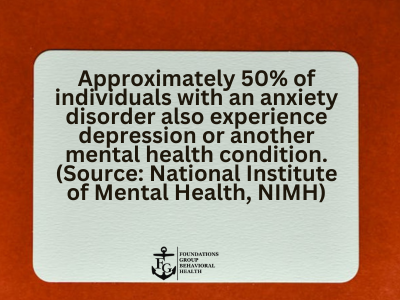Anxiety is one of the most pervasive mental health challenges today, affecting millions of individuals worldwide. It can manifest in various forms, such as generalized anxiety disorder, panic disorder, or social anxiety disorder, each with its own set of debilitating symptoms. For many, anti-anxiety medications serve as a lifeline, providing relief from persistent feelings of worry, fear, or panic. However, medications are not the only solution, and understanding their role within a broader mental health strategy is essential.
At Foundations Group Behavioral Health, we offer holistic treatment options, including Psychiatric Day Treatment, Half-Day Treatment Programs, and Outpatient Mental Health Programs, to help individuals address anxiety effectively. This guide explores anti-anxiety medications, their benefits and risks, and how they can be combined with other therapeutic approaches for lasting recovery.
What Are Anti-Anxiety Medications?
Anti-anxiety medications, or anxiolytics, are designed to reduce the symptoms of anxiety disorders. They target the brain’s chemical imbalances to provide relief from excessive worry, tension, and physical symptoms like rapid heartbeat or shortness of breath.
Types of Anti-Anxiety Medications
- Benzodiazepines
- Examples: Xanax (alprazolam), Ativan (lorazepam), Valium (diazepam).
- How They Work: Benzodiazepines enhance the calming effects of gamma-aminobutyric acid (GABA), a neurotransmitter in the brain.
- Pros: Fast-acting and effective for acute anxiety or panic attacks.
- Cons: High risk of dependency, tolerance, and withdrawal symptoms when used long-term.
- Selective Serotonin Reuptake Inhibitors (SSRIs)
- Examples: Prozac (fluoxetine), Zoloft (sertraline), Lexapro (escitalopram).
- How They Work: SSRIs increase serotonin levels in the brain, promoting a sense of well-being.
- Pros: Suitable for long-term management of anxiety and co-occurring depression.
- Cons: May take 4–6 weeks to show results; possible side effects include nausea, weight changes, and sexual dysfunction.
- Serotonin-Norepinephrine Reuptake Inhibitors (SNRIs)
- Examples: Effexor (venlafaxine), Cymbalta (duloxetine).
- How They Work: SNRIs enhance the activity of serotonin and norepinephrine, improving mood and reducing anxiety.
- Pros: Effective for anxiety and physical symptoms like chronic pain.
- Cons: May cause side effects like increased heart rate or difficulty sleeping.
- Buspirone
- How It Works: A non-benzodiazepine anxiolytic that interacts with serotonin and dopamine receptors.
- Pros: Lower risk of dependency compared to benzodiazepines.
- Cons: Takes several weeks to become fully effective.
- Beta-Blockers
- Examples: Propranolol, Atenolol.
- How They Work: Block the effects of adrenaline, reducing physical symptoms like rapid heart rate and trembling.
- Pros: Effective for situational anxiety (e.g., public speaking).
- Cons: Limited use for generalized anxiety.
Benefits of Anti-Anxiety Medications
When used appropriately, anti-anxiety medications can be transformative, offering relief and helping individuals regain a sense of normalcy in their lives.
- Rapid Symptom Relief
Benzodiazepines provide quick relief for acute anxiety or panic attacks, making them invaluable during crises. - Improved Quality of Life
Reducing anxiety allows individuals to engage more fully in work, relationships, and daily activities. - Enhanced Therapy Participation
Medications can stabilize severe symptoms, enabling individuals to benefit more from therapy sessions. - Treatment for Co-Occurring Disorders
SSRIs and SNRIs are particularly effective for individuals managing both anxiety and depression.
Risks and Limitations of Anti-Anxiety Medications
Despite their benefits, anti-anxiety medications are not without risks. Understanding these challenges is crucial for making informed treatment decisions.
- Dependency and Addiction
Benzodiazepines carry a high risk of dependency, especially when used for extended periods. Withdrawal symptoms can include rebound anxiety, insomnia, and irritability. - Side Effects
Common side effects include drowsiness, dizziness, gastrointestinal issues, and sexual dysfunction. More severe side effects, like memory problems or disorientation, may occur with certain medications. - Masking Underlying Issues
While medications alleviate symptoms, they do not address the root causes of anxiety. This is why therapy is often recommended alongside medication. - Potential for Misuse
Without proper medical supervision, there is a risk of misuse, particularly with fast-acting medications like benzodiazepines.
Alternatives to Medication
Medications are not the only way to manage anxiety. Many individuals find relief through therapy, lifestyle changes, and holistic approaches. At Foundations Group Behavioral Health, we integrate these methods into our treatment programs.
1. Cognitive-Behavioral Therapy (CBT)
CBT is a gold standard for anxiety treatment. It helps individuals identify and challenge negative thought patterns while teaching practical coping strategies.
2. Mindfulness and Relaxation Techniques
Mindfulness practices, such as meditation and deep breathing exercises, can reduce stress and promote relaxation.
3. Lifestyle Adjustments
Regular exercise, a balanced diet, and sufficient sleep are critical for managing anxiety. Activities like yoga and tai chi also provide physical and mental benefits.
4. Group Therapy and Support Networks
Sharing experiences with others who face similar challenges fosters a sense of community and reduces feelings of isolation.
5. Holistic Approaches
Complementary therapies, such as acupuncture or aromatherapy, may provide additional relief for some individuals.

The Role of Comprehensive Treatment Programs
For those facing moderate to severe anxiety, structured programs like those offered at Foundations Group Behavioral Health provide a comprehensive approach to recovery.
1. Psychiatric Day Treatment
- Intensive daily care without the need for hospitalization.
- Includes therapy, skill-building sessions, and psychoeducation.
2. Half-Day Treatment Programs
- Flexible care for individuals balancing treatment with personal or professional responsibilities.
- Focuses on therapeutic techniques, stress management, and emotional regulation.
3. Outpatient Mental Health Programs
- Tailored for those with mild to moderate symptoms who want to maintain daily routines.
- Offers individual and group therapy sessions using evidence-based methods.
4. Co-Occurring Disorder Treatment Program
- Integrated care for individuals with anxiety and co-existing conditions like depression or substance use disorders.
When Should You Consider Anti-Anxiety Medications?
Medications may be appropriate if anxiety symptoms are:
- Interfering with daily life and responsibilities.
- Causing physical symptoms such as heart palpitations, chest pain, or shortness of breath.
- Preventing you from engaging in therapy or other non-medication treatments.
A mental health professional can help determine whether medication is the right choice for you.
Why Choose Foundations Group Behavioral Health?
At Foundations Group Behavioral Health, located in Massachusetts, we specialize in comprehensive mental health care. Our evidence-based programs, including Anxiety Treatment Programs and Depressive Disorder Treatment Programs, are designed to meet the unique needs of each individual.
Our Approach
- Personalized Care: Treatment plans tailored to your specific challenges and goals.
- Holistic Support: Combining medication, therapy, and lifestyle changes for well-rounded care.
- Experienced Team: Compassionate clinicians who specialize in treating anxiety and related disorders.
Take the First Step Toward Recovery
Managing anxiety can feel overwhelming, but you don’t have to face it alone. Whether you’re exploring anti-anxiety medications, therapy, or holistic approaches, Foundations Group Behavioral Health is here to support you every step of the way.
Contact us today to learn more about our programs, including Psychiatric Day Treatment, Outpatient Mental Health Programs, and our specialized Anxiety Treatment Program in Massachusetts. Let us help you reclaim your peace of mind and build a brighter, more balanced future. Contact us today at 888.685.9730 to learn more about our programs and take the first step toward recovery.
FAQ on Anti-Anxiety Medications
What are anti-anxiety medications?
Anti-anxiety medications are prescribed drugs that help alleviate the symptoms of anxiety disorders. They work by calming the nervous system or balancing brain chemicals to reduce excessive worry, fear, and panic.
What types of anti-anxiety medications are commonly prescribed?
Common types include benzodiazepines, SSRIs, SNRIs, buspirone, and beta-blockers. Each type works differently to address anxiety symptoms, depending on the individual’s needs.
Are anti-anxiety medications addictive?
Certain medications, like benzodiazepines, can be addictive if used long-term. It’s important to use them under a doctor’s supervision and explore alternative treatments if dependency is a concern.
How long does it take for anti-anxiety medications to work?
Fast-acting medications like benzodiazepines provide immediate relief, while SSRIs and SNRIs may take 4–6 weeks to show significant effects.
What are the risks of taking anti-anxiety medications?
Risks include dependency, side effects such as drowsiness and nausea, and withdrawal symptoms if stopped abruptly. Always consult a healthcare provider before starting or stopping any medication.
Are there alternatives to medication for managing anxiety?
Yes, alternatives include Cognitive Behavioral Therapy (CBT), mindfulness practices, lifestyle changes like exercise and diet, and participation in structured programs such as Psychiatric Day Treatment or Half-Day Treatment Programs.
Can I combine medication with therapy?
Absolutely. Combining medication with therapy, such as CBT, often provides the most effective results by addressing both symptoms and underlying causes of anxiety.








